This article is part of the campaign DSA for YOUth - Protecting minors by design, focusing on the DSA guidelines for the protection of minors under the DSA, including the age verification (AV) and age-appropriate (AA) measures, and translating these rules into clear, practical, and jargon-free resources. In this insight series, we explore how different Safer Internet Centres are working at the national level to raise awareness about the DSA and how it impacts the everyday lives of young people, their parents or caregivers, and teachers and educators.
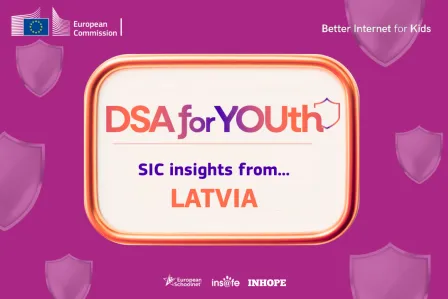
To inform the society in Latvia about the Digital Services Act (DSA), and to explain how social media platforms are regulated with the safety of internet users - and especially children and young people - in mind, the Latvian Safer Internet Centre (SIC) has carried out a series of activities.
Meeting with the Minister of Smart Administration and Regional Development of the Republic of Latvia
The Minister invited the Latvian SIC to a meeting to discuss the DSA requirements, and more specifically, to discuss age verification to protect young users from accessing inappropriate or harmful content, as well as to agree on Latvia's position on these issues in the advancement of various political documents.
During the meeting, common interests and activities were clarified, and cooperation and mutual support were discussed. Such meetings are especially valuable to increase the SIC's visibility and for establishing contacts, cooperation, and receiving support at the national level.
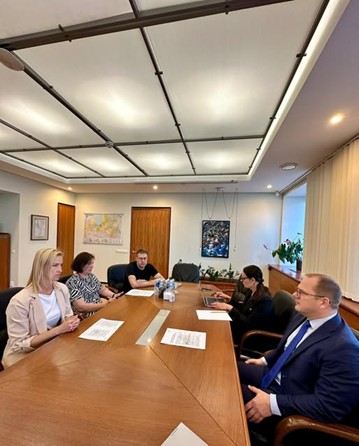
Useful guides for parents
To raise awareness of parents and caregivers about privacy and safety of their children online, two practical step-by step guides were developed:
“Teen accounts”: what are they and how do teen accounts differ from other social media accounts?
1,300 downloads were recorded in the website, and the guide reached more than 6,500 users on Facebook and Instagram.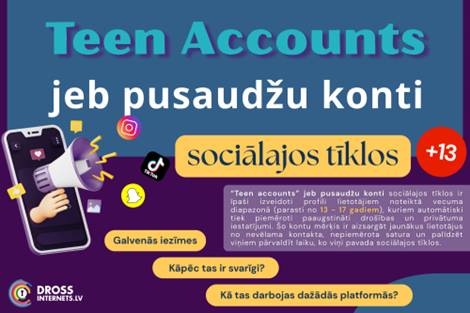
- Step-by-step guide to parental control tools
The guide summarises the monitoring and control settings available in the most popular apps, as well as information about separately downloadable parental control apps to monitor and control children's online activities to keep them safe.
3,500 downloads were recorded in the website, and the guide reached more than 11,000 users on Facebook and Instagram.
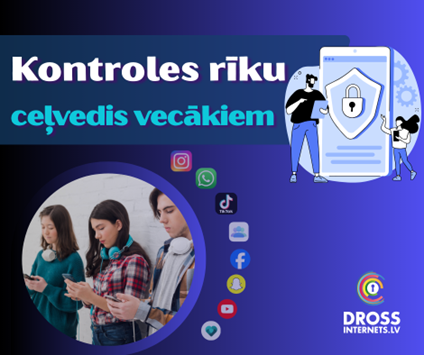
The article “What does "teen accounts" mean on social media platforms?” received considerable attention
An article gave insights about “teen accounts” that the most popular social media platforms such as Instagram, Snapchat, TikTok, etc. have introduced according to DSA requirements. Detailed information was provided that “teen accounts” are designed to protect 13-17-year-old teenagers from specific risks online, such as harassment, age-inappropriate and harmful content. Unlike adult accounts, which are public by default, accounts intended for teenagers are given additional security and privacy features. Accounts are automatically activated as private for users in a certain age group (13–17 years old), so it is recommended to indicate the user's real age when registering. To protect children from unwanted and harmful content, as well as traumatic experiences, parents and caregivers should be aware that most social media platforms only allow registration from the age of 13. In addition, the article provided detailed information on what DSA means and what are the requirements, how teen accounts work, and what parents should take into account to ensure a safer internet environment for their children.
Presentations for students and parents
The Latvian SIC regularly visits schools and offers lectures for children and parents about online risks, including privacy, cyberbullying, sexting, grooming, inappropriate and illegal content, and more. During the school summer break, presentations were updated to include information about the importance of DSA.
Find more information about the work of the Latvian Safer Internet Centre, including their awareness raising, helpline, hotline, and youth participation services – or find similar information for Safer Internet Centres throughout Europe.
Interested in more?
If you are interested in more, explore the DSA for YOUth toolkit to learn how the Digital Services Act (DSA) protects minors by design. There, you will find a family-friendly booklet explaining the DSA guidelines on what online platforms should do to keep kids and teens safe online, easy-to-read explainers, a quiz, and other resources.
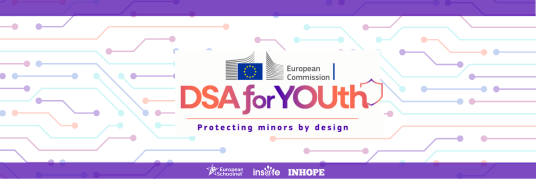
This article is part of the campaign DSA for YOUth - Protecting minors by design, focusing on the DSA guidelines for the protection of minors under the DSA, including the age verification (AV) and age-appropriate (AA) measures, and translating these rules into clear, practical, and jargon-free resources. In this insight series, we explore how different Safer Internet Centres are working at the national level to raise awareness about the DSA and how it impacts the everyday lives of young people, their parents or caregivers, and teachers and educators.

To inform the society in Latvia about the Digital Services Act (DSA), and to explain how social media platforms are regulated with the safety of internet users - and especially children and young people - in mind, the Latvian Safer Internet Centre (SIC) has carried out a series of activities.
Meeting with the Minister of Smart Administration and Regional Development of the Republic of Latvia
The Minister invited the Latvian SIC to a meeting to discuss the DSA requirements, and more specifically, to discuss age verification to protect young users from accessing inappropriate or harmful content, as well as to agree on Latvia's position on these issues in the advancement of various political documents.
During the meeting, common interests and activities were clarified, and cooperation and mutual support were discussed. Such meetings are especially valuable to increase the SIC's visibility and for establishing contacts, cooperation, and receiving support at the national level.

Useful guides for parents
To raise awareness of parents and caregivers about privacy and safety of their children online, two practical step-by step guides were developed:
“Teen accounts”: what are they and how do teen accounts differ from other social media accounts?
1,300 downloads were recorded in the website, and the guide reached more than 6,500 users on Facebook and Instagram.
- Step-by-step guide to parental control tools
The guide summarises the monitoring and control settings available in the most popular apps, as well as information about separately downloadable parental control apps to monitor and control children's online activities to keep them safe.
3,500 downloads were recorded in the website, and the guide reached more than 11,000 users on Facebook and Instagram.

The article “What does "teen accounts" mean on social media platforms?” received considerable attention
An article gave insights about “teen accounts” that the most popular social media platforms such as Instagram, Snapchat, TikTok, etc. have introduced according to DSA requirements. Detailed information was provided that “teen accounts” are designed to protect 13-17-year-old teenagers from specific risks online, such as harassment, age-inappropriate and harmful content. Unlike adult accounts, which are public by default, accounts intended for teenagers are given additional security and privacy features. Accounts are automatically activated as private for users in a certain age group (13–17 years old), so it is recommended to indicate the user's real age when registering. To protect children from unwanted and harmful content, as well as traumatic experiences, parents and caregivers should be aware that most social media platforms only allow registration from the age of 13. In addition, the article provided detailed information on what DSA means and what are the requirements, how teen accounts work, and what parents should take into account to ensure a safer internet environment for their children.
Presentations for students and parents
The Latvian SIC regularly visits schools and offers lectures for children and parents about online risks, including privacy, cyberbullying, sexting, grooming, inappropriate and illegal content, and more. During the school summer break, presentations were updated to include information about the importance of DSA.
Find more information about the work of the Latvian Safer Internet Centre, including their awareness raising, helpline, hotline, and youth participation services – or find similar information for Safer Internet Centres throughout Europe.
Interested in more?
If you are interested in more, explore the DSA for YOUth toolkit to learn how the Digital Services Act (DSA) protects minors by design. There, you will find a family-friendly booklet explaining the DSA guidelines on what online platforms should do to keep kids and teens safe online, easy-to-read explainers, a quiz, and other resources.

- DSAforYOUth DSA (Digital Services Act)
Related content
- < Previous article
- Next article >












